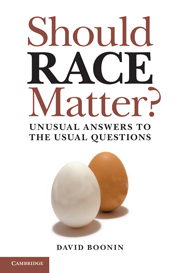Book contents
- Frontmatter
- Contents
- Preface
- 1 Thinking in Black and White
- 2 Repairing the Slave Reparations Debate
- 3 Advancing the Slave Reparations Debate
- 4 One Cheer for Affirmative Action
- 5 Two Cheers for Affirmative Action
- 6 Why I Used to Hate Hate Speech Restrictions
- 7 Why I Still Hate Hate Speech Restrictions
- 8 How to Stop Worrying and Learn to Love Hate Crime Laws
- 9 How to Keep on Loving Hate Crime Laws
- 10 Is Racial Profiling Irrational?
- 11 Is Racial Profiling Immoral?
- Notes
- Sources
- Index
10 - Is Racial Profiling Irrational?
The Answer Isn’t Black and White
Published online by Cambridge University Press: 05 June 2012
- Frontmatter
- Contents
- Preface
- 1 Thinking in Black and White
- 2 Repairing the Slave Reparations Debate
- 3 Advancing the Slave Reparations Debate
- 4 One Cheer for Affirmative Action
- 5 Two Cheers for Affirmative Action
- 6 Why I Used to Hate Hate Speech Restrictions
- 7 Why I Still Hate Hate Speech Restrictions
- 8 How to Stop Worrying and Learn to Love Hate Crime Laws
- 9 How to Keep on Loving Hate Crime Laws
- 10 Is Racial Profiling Irrational?
- 11 Is Racial Profiling Immoral?
- Notes
- Sources
- Index
Summary
A young man is driving on the New Jersey Turnpike. Like most people on the road, he’s going a bit over the speed limit. Unlike most people on the road, he’s pulled over by a cop. The cop is hoping that if he pulls over enough people, he’ll catch some drug traffickers, either because their drugs will be clearly visible when they roll down their window or because they’ll consent to a search of their vehicle when they’re pulled over and incriminating evidence will be discovered as a result. The cop explains his decision to pull over this particular driver by pointing out that the young man was exceeding the posted speed limit and that he had changed lanes at least twice without first engaging his turn signal for the required amount of time. And this is, indeed, part of the story. If the cop hadn’t seen the driver commit these moving violations, he wouldn’t have pulled him over. But, as every police officer knows, it’s virtually impossible to drive for any sustained period of time without committing at least some sort of moving violation. And the fact is that the cop saw a number of other drivers exceeding the posted speed limit and changing lanes without using their turn signals at all. He didn’t pull them over, but he did pull this particular driver over. And the reason he pulled this one over rather than the others is that this particular young man is black and the cop believed that he was therefore more likely to be carrying illegal drugs. In deciding which speeding drivers to pull over, in other words, the cop targeted the drivers by race. Has the cop done something wrong?
Americans as a whole seem to agree about very little when it comes to the debate about racial matters in this country. But if there’s one opinion that they do by and large seem to share, it’s that the answer to this question is yes. President Clinton referred to such racial profiling as “morally indefensible” and “wrong,” and President Bush after him said “It’s wrong, and we will end it in America.” Al Gore is on the record as opposing racial profiling, and so is Dick Cheney. Indeed, the conviction that such racial profiling is wrong may be one of the few things that unite liberals like Ira Glasser of the ACLU, conservatives like Dinesh D’Souza of the Hoover Institution, and libertarians like William Anderson and Gene Callahan of the Ludwig von Mises Institute. A 1999 Gallup poll, moreover, found that fully 81 percent of Americans disapproved of racial profiling, and it’s hard to find an opinion about anything that 81 percent of Americans can agree about, let alone an opinion about anything relating to race. Since the events of September 11, 2001, of course, a number of people have become more open to the use of racial profiling in the context of preventing terrorist attacks. But, at least in the more mundane kinds of cases that I’ll be concerned with in this chapter and the chapter that follows, where in the context of ordinary crimes like shoplifting or drug trafficking a police officer subjects a young man to a greater degree of scrutiny and investigation because he’s black, there remains a powerful and striking consensus in this country: this sort of racial profiling is simply unacceptable.
- Type
- Chapter
- Information
- Should Race Matter?Unusual Answers to the Usual Questions, pp. 300 - 326Publisher: Cambridge University PressPrint publication year: 2011



